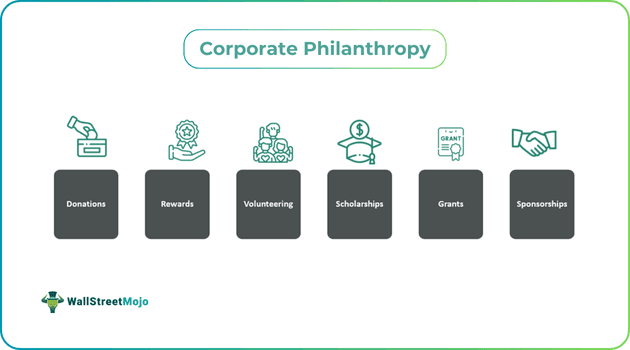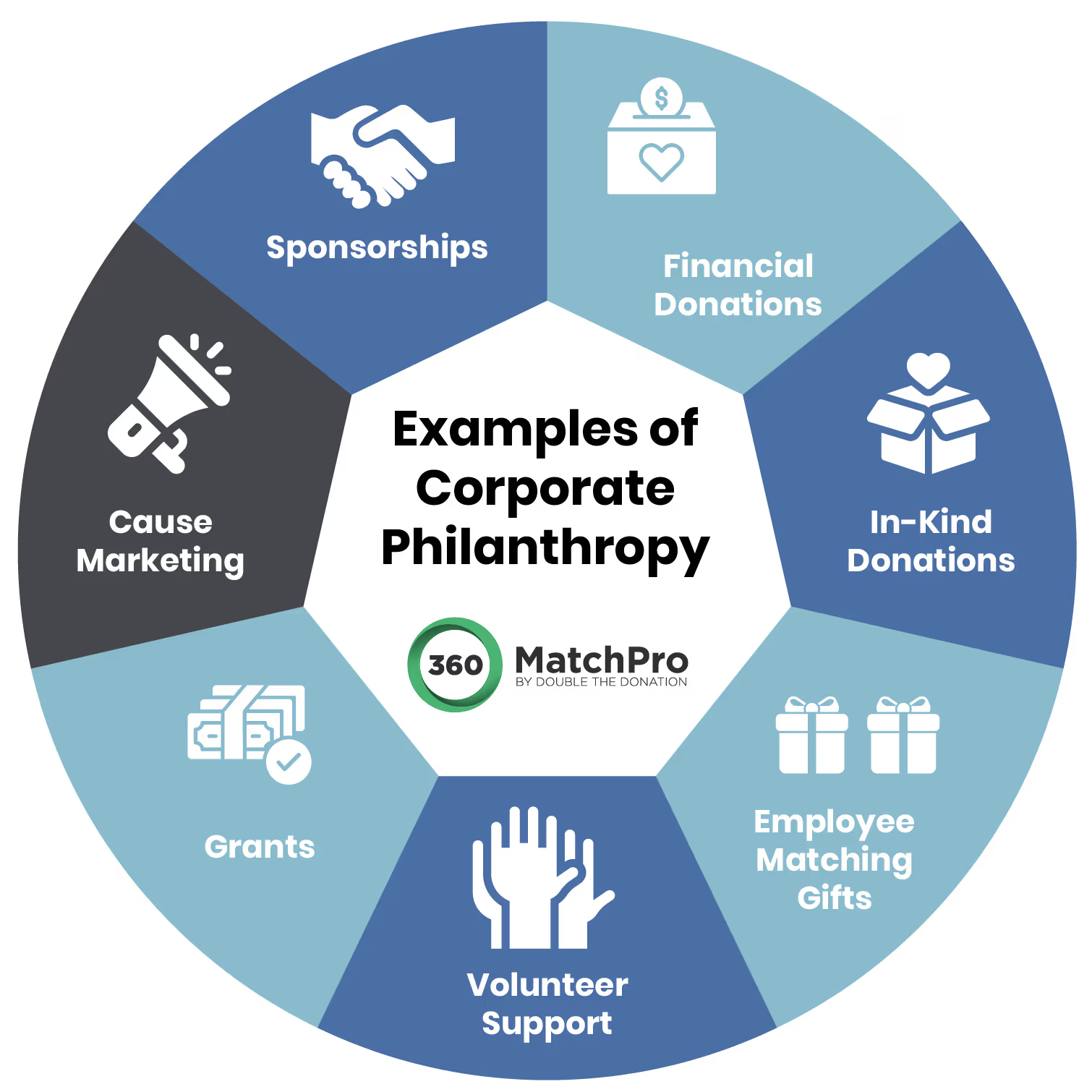Corporate philanthropy decoded: Essential definitions and examples
Discovering How Corporate Philanthropy Shapes Brand Name Online Reputation and Client Loyalty
Company philanthropy substantially affects brand name online reputation and client loyalty. Firms that involve in authentic philanthropic initiatives often see a favorable shift in just how consumers perceive them. This placement of values promotes trust and psychological connections with target markets. Nevertheless, the effectiveness of these kind efforts can vary substantially. Understanding what genuinely reverberates with consumers is crucial for brands looking for to enhance their social effect and market position. What methods will become vital for future success?
The Development of Corporate Philanthropy
As organizations increasingly identify their role in culture, the development of corporate philanthropy has actually changed from simple philanthropic donations to a calculated component of brand identification. Companies engaged in philanthropy mostly for tax obligation advantages or to enhance their public photo. In time, this technique changed as stakeholders-- including investors, employees, and customers-- demanded a much more authentic commitment to social responsibility.
Organizations began aligning their humanitarian efforts with their core worths and organization purposes, bring about more impactful and thoughtful payments. This adjustment has actually urged business to purchase lasting techniques and community advancement, fostering a sense of purpose that reverberates with customers.
In addition, technical improvements have actually assisted in transparency and interaction, allowing businesses to display their humanitarian efforts better. Subsequently, corporate philanthropy has emerged as an integral component of company strategy, with companies accepting the chance to positively affect culture while improving their general brand narrative.
The Effect of Philanthropy on Brand Name Perception
While business take part in kind efforts to advertise social good, these efforts significantly shape brand name perception amongst consumers. Business philanthropy can enhance a brand's photo by connecting it with positive social effect and community involvement. Customers typically regard brands that proactively take part in philanthropic activities as even more trustworthy and liable. This perception can influence investing in decisions, as customers may like brand names that demonstrate a commitment to social problems.

Structure Emotional Links Through Providing
Business philanthropy acts as an effective device for boosting brand name identity by connecting business worths with area demands. Via strategic giving, companies can promote area involvement and develop common worths that reverberate with customers on a psychological level. This strategy not just reinforces brand name online reputation but additionally constructs lasting links in between companies and their stakeholders.
Enhancing Brand Identity
When companies participate in philanthropic efforts, they not just add to social great however likewise forge much deeper psychological links with their audiences. By straightening their brand with charitable reasons, firms enhance their identification and signal worths that reverberate with customers. This positioning creates a story that goes beyond services and products, welcoming clients to join a shared objective. As customers progressively focus on purpose-driven brands, companies that proactively participate in giving can separate themselves in a jampacked market. Such initiatives cultivate a sense of loyalty among clients who really feel personally attached to the brand's values. Ultimately, business philanthropy becomes an important tool for improving brand identity, growing lasting partnerships based on common beliefs and emotional involvement.
Fostering Neighborhood Involvement
Various research studies indicate that business taking part in community-focused humanitarian campaigns can markedly enhance psychological connections with their stakeholders. By purchasing local jobs and sustaining social causes, services grow a sense of belonging and depend on within the area. This engagement promotes a favorable brand picture, as consumers value companies that demonstrate real concern for societal problems. In addition, employees commonly really feel more honored and motivated to be associated with an organization that focuses on area well-being. Therefore, customers are most likely to develop commitment towards brand names that actively add to meaningful causes. Inevitably, cultivating community involvement through philanthropy not only enhances brand name reputation but also develops lasting emotional ties that profit both the firm and the neighborhood it offers.
Producing Shared Worths
Just how can organizations effectively produce common values that reverberate with their stakeholders? Companies can accomplish this by straightening their philanthropic initiatives with their core objective and the interests of their neighborhoods. By taking part in efforts that attend to local demands, businesses promote psychological connections with customers, enhancing brand commitment. For instance, partnering with non-profits that reflect shared worths enhances the brand name's picture and shows commitment to social obligation. Furthermore, transparent interaction regarding these efforts enables stakeholders to see the concrete influence of their payments. Ultimately, by incorporating shared worths into their company philanthropy, business not just enhance their track records but additionally cultivate long-term connections with consumers, leading to raised loyalty and trust fund. This positioning is important in modern-day consumer decision-making.
Situation Researches: Successful Philanthropic Campaigns
Checking out successful kind campaigns reveals numerous strategies that improve brand name credibility. Impactful area initiatives, ingenious collaboration designs, and long-lasting involvement strategies have confirmed effective in promoting favorable links with consumers. These study highlight the relevance of thoughtful corporate giving up accomplishing both social and organization objectives.
Impactful Community Initiatives
Lots of firms have successfully leveraged philanthropic campaigns to improve their brand name online reputation while making a meaningful effect in their neighborhoods. A modern technology company released an electronic proficiency program in underserved areas, giving training and sources that encouraged neighborhood homeowners. This campaign not just added to area advancement however likewise positioned the business as a socially accountable leader. A major food firm applied a cravings alleviation campaign, partnering with local nonprofits to disperse dishes to families in demand. This initiative enhanced neighborhood ties and cultivated consumer loyalty. With these impactful campaigns, firms have actually demonstrated their dedication to social duty, successfully aligning their brand worths Check Out Your URL with the requirements of the communities they offer, eventually enhancing their total online reputation.
Ingenious Partnership Versions
The success of impactful neighborhood initiatives usually depends upon ingenious partnership versions that bring together varied stakeholders to attend to complex social obstacles. Study show exactly how firms, non-profits, and government entities can collaborate successfully. As an example, an international corporation partnered with a neighborhood charitable to launch an education and learning program, pooling sources and competence to enhance neighborhood proficiency rates. An additional example included a technology company and a health care company signing up with forces to establish a telemedicine remedy for underserved populaces. These partnerships not just intensified the reach of philanthropic efforts yet additionally reinforced the brands' online reputations by aligning their missions with neighborhood demands. Inevitably, innovative partnership designs offer as a stimulant for meaningful change and foster stronger connections between brands and their consumers.
Long-lasting Involvement Approaches

Measuring the ROI of Corporate Social Duty
As business progressively purchase company social obligation (CSR) initiatives, recognizing the roi (ROI) related to these efforts becomes essential. Determining ROI in CSR is multifaceted, often incorporating both qualitative and measurable metrics. Monetary returns can be evaluated via boosted sales, enhanced brand name loyalty, and boosted worker spirits, which can result in greater efficiency. In addition, business might examine price financial savings linked to sustainable techniques, such as decreased waste or power usage.
Qualitatively, the influence of CSR on brand online reputation can be assessed via consumer understanding studies and social networks sentiment analysis. Studies can provide understandings right into how CSR tasks affect customer commitment and trust. Benchmarking versus industry requirements can aid companies evaluate their CSR effectiveness - corporate philanthropy. Ultimately, an extensive approach to gauging ROI enables business to make enlightened choices about future CSR investments, lining up approaches with both economic performance and social impact
Consumer Expectations and Business Duty
Significantly, consumers expect companies to operate with a strong sense of business obligation, checking out moral techniques as a requirement for brand name commitment. This change in assumption mirrors an expanding awareness of social and environmental issues, leading customers to favor brands that align with their values. Customers are much more inclined to support companies that engage in clear techniques, show sustainability, and add favorably to their neighborhoods.
Social media magnifies these expectations, allowing consumers to share their opinions and experiences rapidly. Brands that fall short to satisfy these ethical criteria run the risk of reaction, while those that accept corporate duty usually enjoy superior track record and customer commitment. As consumers require accountability, firms should incorporate business social obligation right into their core methods, prioritizing honest behavior not equally as a marketing method, but as an essential aspect of their operations. This placement can eventually result in more powerful brand fondness and continual success in competitive markets.
Future Fads in Corporate Philanthropy and Brand Name Loyalty
The landscape of business philanthropy is advancing, influenced by the elevated customer expectations bordering company responsibility. Business are significantly integrating social effect right into their core company methods, not just as an ancillary activity. Future patterns show a change toward transparency, with brands sharing thorough information about their humanitarian campaigns and their straight effects on communities.
Additionally, technology is playing an important role, enabling real-time interaction in between customers and brand names. Social media systems help with straight interaction, enabling customers to articulate their assumptions and hold brand names accountable. In addition, more youthful generations, specifically Millennials and Gen Z, prioritize sustainability and honest techniques, driving businesses to embrace even more diligent methods.
As business philanthropy becomes synonymous with brand identity, business that authentically align their missions with societal requirements are likely to promote more powerful consumer loyalty. This convergence of values will inevitably form the future of corporate credibility and consumer relationships in a progressively diligent market.
Often Asked Inquiries
How Do Customers Discover a Business's Philanthropic Initiatives?
Customers uncover a business's philanthropic efforts through numerous channels, including social media, press releases, community occasions, and word-of-mouth. These avenues help with understanding, enabling people to involve with brands that straighten with their rate of interests and worths.
What Role Does Staff Member Involvement Play in Business Philanthropy?
Staff member participation in business philanthropy improves involvement, cultivates this hyperlink a feeling of ownership, and reinforces group communication - corporate philanthropy. This involvement commonly intensifies the impact of philanthropic initiatives, bring about higher awareness and assistance for the business's philanthropic efforts
Can Corporate Philanthropy Backfire on a Brand's Reputation?
Business philanthropy can indeed backfire on a brand's credibility if viewed as next page opportunistic or insincere. Negative public assumption might emerge, causing decreased trust and commitment amongst customers that focus on authenticity in company activities.
Are Smaller Firms as Effective in Philanthropy as Larger Corporations?
Smaller business can be similarly effective in philanthropy as larger firms, usually demonstrating agility and credibility. Their local initiatives may resonate extra deeply with communities, cultivating genuine connections in spite of limited resources contrasted to their bigger equivalents.
Just How Can Firms Pick the Right Causes to Support?
Business can choose the ideal causes by straightening their values with area demands, evaluating stakeholder passions, and evaluating prospective effect. This strategic approach fosters authenticity, boosts involvement, and strengthens connections with clients and the broader area.
While firms engage in kind efforts to advertise social good, these initiatives significantly shape brand name perception amongst customers. As consumers significantly focus on purpose-driven brands, companies that proactively involve in offering can distinguish themselves in a congested market. Several firms have efficiently leveraged kind projects to improve their brand online reputation while making a meaningful impact in their neighborhoods. Increasingly, customers anticipate business to run with a strong sense of business duty, checking out honest methods as a requirement for brand name loyalty. As corporate philanthropy ends up being associated with brand name identity, business that authentically align their goals with social requirements are most likely to cultivate stronger consumer commitment.